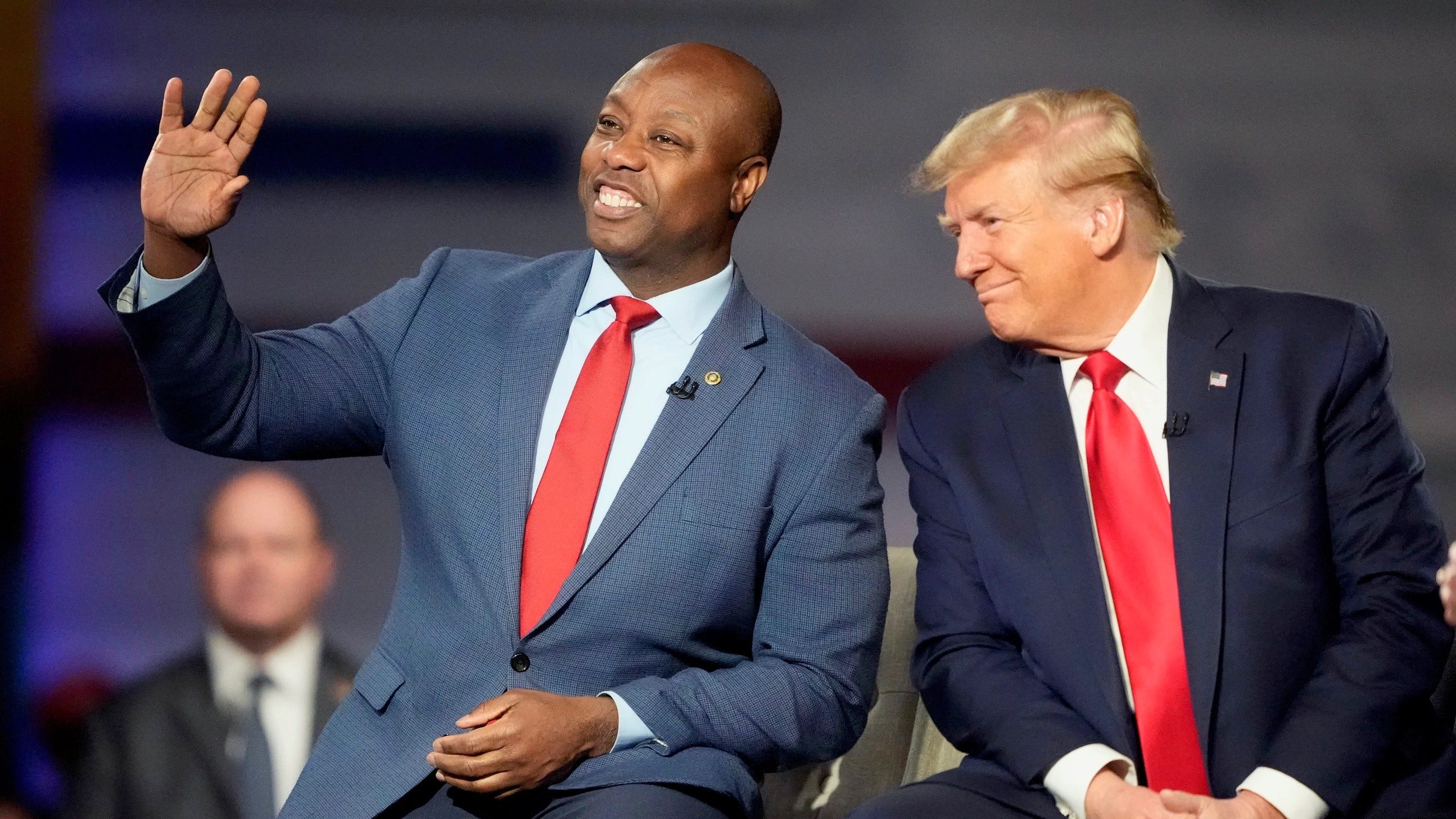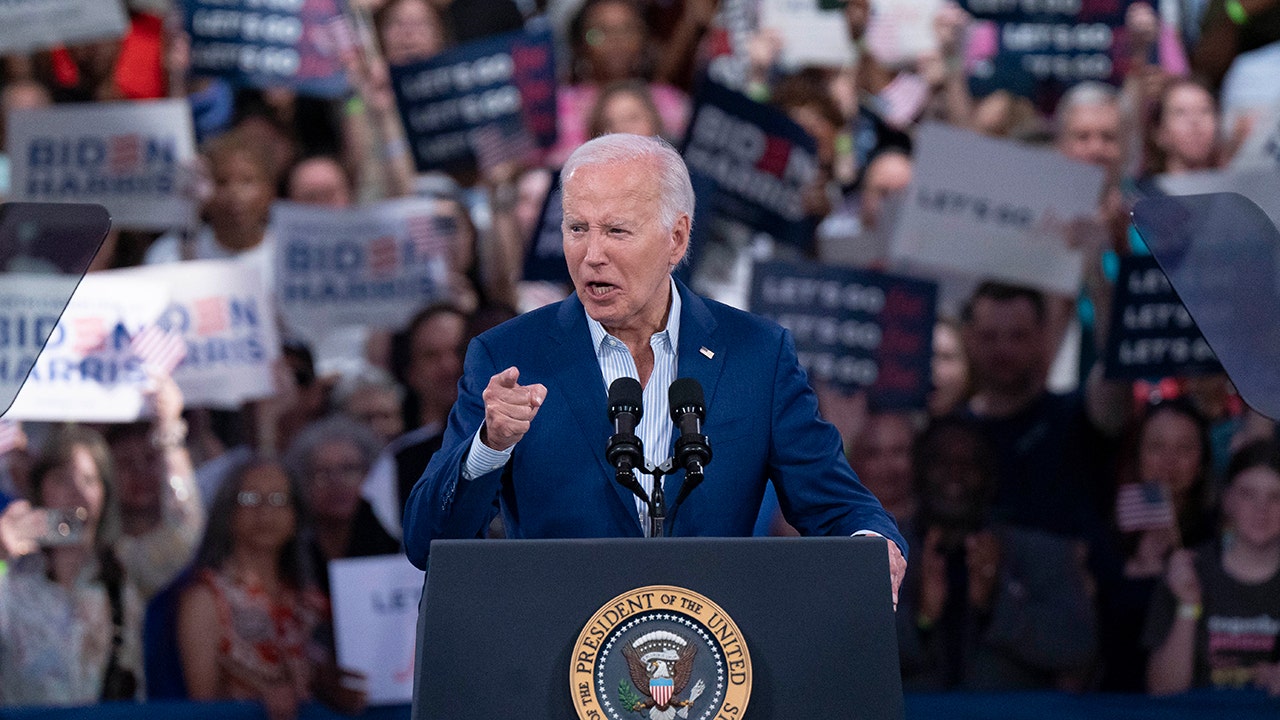Finance
Finance: Pyne had all the Proof he needed for latest Bruin Capital majority stake

The catering company Proof of the Pudding has a growing list of sports clients, including major golf events like the Presidents Cup.

Three decades ago, Bruin Capital founder and CEO George Pyne spent five years in Atlanta working for the city’s chamber of commerce and, later, for world-renowned architect John Portman. During that stretch of the early 1990s, he discovered a local catering company, Proof of the Pudding, that provided services to some of the city’s iconic venues and convention centers. Now, some 30 years later, Proof has quietly built a strong and still-growing sports practice, and Pyne’s Bruin has acquired a majority stake in the business with plans for future expansion.
“I lived in Atlanta from 1990 to 1995, and even back in those days, Proof had an incredible reputation,” recalled Pyne. “I can’t believe we’re talking about it in 2023. In the 1990s they were one of the best at what they did. So the opportunity to work with them now, for me, is very satisfying.”
Proof of the Pudding may still not have the name-recognition of industry giants like Aramark or Sodexo, but it’s hardly a mom-and-pop business. The 44-year-old company now has some 1,700 employees nationwide and feeds over one million people annually. It’s long managed food services for venues like Zoo Atlanta and the Jimmy Carter Presidential Library and Museum, and it catered the 1996 Olympic Games.
Around 10 years ago, the business expanded into collegiate athletics, first providing food services for suites and club seats at the University of Georgia. Proof of the Pudding now has eight collegiate clients, including Alabama, Auburn, Duke, Georgia Tech and Mississippi State. A ninth such deal is in the pipeline. The company has also begun managing training tables — high-performance food services for athletes — for Duke, Georgia Tech and the Atlanta Hawks.
That’s in addition to Proof’s arena business, which includes Georgia’s Gas South Arena and Gateway Center Arena. And the company has expanded into automotive racing, providing food services for Michelin Raceway Road Atlanta and, for its annual Formula One race, the Circuit of the Americas. Proof’s golf event clientele includes the Masters, the Tour Championship, the Players Championship, the Presidents Cup and this past weekend’s AT&T Byron Nelson outside Dallas, among others.

Noyes
Adam Noyes, the president of Proof of the Pudding, had been considering what the next chapter for his company might look like when a mutual acquaintance introduced him to Pyne more than three years ago. The two hit it off, though early talks of a potential acquisition were put on hold due to COVID. Pyne remembered that the crisis only reaffirmed his belief in the catering business, as Proof proceeded to run food services for seven overflow hospitals.
Negotiations restarted in earnest last September, with the deal closing on May 5. Both sides declined to share financial details of the transaction, though Noyes’ family will retain a “significant” minority stake in the business. The catering company has grown quickly in recent years, especially with the additions of sports verticals. Its revenue, now in the low nine figures, is up 800% over the last decade, with most of that growth coming in the past five years.
“At this point in our journey, Bruin can really help us go out there, open some doors for us, help us on the mergers and acquisitions side,” said Noyes. “They’ve got a proven track record and can help bring more value to our existing clients. We’ve already been working on human resources, building our bench strength on the marketing side, building out our accounting teams to be ready for this journey. And we’re just super excited to be at the point where we can now move forward.”
Big names headline Bruin’s first portfolio summit
In late March, Bruin Capital hosted its first portfolio summit at the Fairmont Grand Del Mar luxury hotel north of San Diego. The investment firm gathered the leaders of five of its portfolio companies — Engine Shop, Full Swing, OddsChecker, TGI Sport and Two Circles — for two-plus days of panels and networking. Conversations focused on hot-button issues like changing media trends, the M&A landscape, sports and entertainment consumer spending and the future of the sports economy.
Those discussions were sparked by on-stage speakers in former White House deputy chief of staff Karl Rove, UTA CEO Jeremy Zimmer, Los Angeles Dodgers President and CEO Stan Kasten, and San Diego Padres owner Peter Seidler and CEO Erik Greupner. Among the others in attendance: longtime sports media exec and Genius Sports President of North America Steve Bornstein, UTA and Warner Music Group board member Ceci Kurzman, CAA’s Chris Silbermann and former NFL general manager and ESPN insider Mike Tannenbaum.
For Pyne, the deal is, in part, a bet on the growing value of high-quality, premium experiences around sports and entertainment. He also sees synergies with some of Bruin’s existing portfolio companies that engage with sports hospitality, namely sports marketing firms Two Circles and TGI Sport. And Pyne ultimately believes that Proof can serve as the foundation atop which Bruin can build a far more complex and holistic business.
“We see this as a platform that today is hospitality, but tomorrow could have other things, other technology, who knows. Ticketing, data, marketing, other elements,” said Pyne. “Also, we will be aggressive in acquisitions if those opportunities exist.”
“High-end hospitality experiences are a part of sports, and we’re working with every major league and federation in the world. We have boots on the ground in 16 countries, and we think we can help expand [Proof’s] capabilities,” he added. “We have capital, we have a footprint and we think when we combine those things, good things can happen.”
Chris Smith writes a monthly column on finance news and trends. He can be reached at crsmith@sportsbusinessjournal.com.

Finance
Montana GOP, Busse file campaign finance complaints • Daily Montanan

The Montana GOP said the Democratic candidate for governor is illegally spending money on his wife’s communications company — but Democrat Ryan Busse, challenging the Republican incumbent, alleges Gov. Greg Gianforte improperly funneled $1 million to his campaign manager’s companies.
Both candidates deny the allegations in the respective complaints filed this month with the Commissioner of Political Practices.
Busse claims Gianforte paid campaign manager Jake Eaton and other staff affiliated with the campaign more than $1 million through Eaton’s companies. The payments are disclosed in financial reports, but the Busse campaign says they violate the law against “secret pass-through payments.”
Gianforte campaign spokesperson Anna Marian Block said in a statement Friday the campaign is in full compliance with the law.
“This complaint is nothing more than a desperate attempt to distract voters from the fact that Ryan Busse is trailing in the polls by 21%,” Block said.
Meanwhile, the Montana Republican Party alleges the Busse campaign allocated several thousand dollars to his wife’s communications company in violation of a law prohibiting surplus funds going to candidates for “personal benefit,” which includes family members.
In a response filed Friday, Busse’s campaign called the complaint “utterly meritless” and said contrary to the allegations, the communications work is being done by an experienced professional and legally must be compensated.
Busse: Gianforte isn’t disclosing payments to staff for campaign work
Eaton owns consulting firm The Political Company as well as political sign printing shop and marketing firm Ultra Graphics, both in Billings. The Busse campaign’s complaint, filed Friday, lists more than 25 payments from Gianforte’s campaigns to both companies between March and June of this year. The campaign says Gianforte should have made those payments to Eaton personally, instead of through his companies, for his consulting work.
Eaton noted in his email Friday political parties can submit expenditures for campaigns and noted the Montana Republican State Central Committee report is where the expenses for staff are listed, including his own. The committee’s report for the first quarter of the year notes The Political Company was paid three installments of $12,500, as well as salaries for staff listed in the complaint.
The complaint, authored by Busse staffer Emily Harris, said the Gianforte campaign has previously this election cycle tried to sidestep accountability for including false information about immigration in an ad. After taking the ad down, the campaign told Montana’s ABC/Fox affiliate the ad was done by an “outside contractor”and the campaign decided to remove it. Busse’s camp is claiming the ad was created by Eaton’s company, basing that off the time of the ad and when it was published.
Busse’s complaint also claims it is implausible Gianforte raised $1.2 million from when he officially became a candidate in January, but doesn’t point to concrete evidence Gianforte started raising money prior to becoming a candidate other than campaign contribution amounts being suspicious. Busse believes because the donations were all the same amount and at the maximum amount that could be donated by one person at a time, $2,240, it raises concern as it doesn’t match donation amounts from in person events which were around $100.
Harris wrote Gianforte started campaign activities earlier than is legally allowed as an internal poll came out days after he officially became a candidate, but also made the claim on “information and belief.”
The complaint also listed a number of staffers that claim through social media as well as in news reports to be affiliated with the campaign, but are not included in the expenditures for the campaign.
Harris also listed more than 20 expenditures from Gianforte’s campaign saying the descriptions were too vague and did not comply with the same statute referenced in the complaint against Busse for signs and media placement.
The Busse campaign also said money “passed through Eaton’s companies goes to other Republican-aligned vendors—payments Gianforte conceals from his reporting.” The complaint did not list which vendors, though.
GOP: Busse giving campaign funds to wife for communications work
The complaint from the state GOP, signed June 14, says Busse’s campaign paid Aspen Communications, owned by Sarah Swan Busse, a total of just more than $12,000 for communications and fundraising consulting, as well as car mileage. Sara Swan Busse is Ryan Busse’s wife.
The complaint also said candidate Busse receives a salary from Aspen Communications, which the campaign refutes as not affiliated with the election.
But because the salary would directly benefit Busse and his wife, the GOP alleges Busse is in violation of state law that prohibits surplus campaign funds from directly benefiting candidates or their family members.
The Busse campaign, in a response authored by campaign manager Aaron Murphy, said Sara Busse is an “independent experienced professional” and her work legally must be compensated fairly.
It listed her experience in the field working on western district democratic candidate Monica Tranel’s Congressional campaign during the 2022 election cycle.
The Busse camp also said the statute cited by the GOP regarding personal benefit from campaign funds isn’t relevant as it concerns how funds are dealt with after the campaign, not during. Murphy wrote the GOP likely meant to cite an administrative rule saying candidates cannot use campaign funds for personal use, but he said the campaign didn’t break that rule either.
“All expenditures and reimbursements to Sara Busse and Aspen Communications are directly connected to her fundraising and communications work for the campaign—they support the campaign and would not exist without it,” the response read.
“The campaign’s contract with Aspen Communications is not to compensate Ryan Busse. Ryan Busse receives no compensation from the campaign (excluding reimbursements for mileage, etc.),” the response read. “Ryan Busse’s occasional work for Aspen Communications, as listed on his personal disclosure, is entirely separate and distinct from the campaign.”
Murphy also said if hiring spouses was at issue, it would call into question the ethics of the state paying attorney Emily Jones, wife of Gianforte’s campaign manager Jake Eaton, for her work as an attorney with the state.
The GOP complaint also said Busse’s campaign was not thorough in its description of the services paid for with campaign funds, as is required in statute.
This included a $250,000 ad buy from media strategy company Left Hook with the description “statewide broadcast tv ad buy” and a nearly $7,800 purchase from progressive campaign sign producer Blue Deal with the description “signs.”
Montana Commissioner of Political Practices Chris Gallus said the timeline for determining whether his office will move forward with a formal investigation in the complaint against Busse is not known at this time. His office will send a letter Monday requesting Gianforte’s response to the complaint by Busse.
Editor’s Note: the headline of this story was amended to reflect the Montana GOP filing the campaign finance complaint against Ryan Busse.
Finance
California high schools will require personal finance course for graduation under new bill

Beginning with the graduating class of 2031, high school students in California will be required to complete one semester of a personal finance course before receiving their diplomas.
On Thursday, Gov. Gavin Newsom signed legislation to require personal finance education for high school graduates after the state Senate and Assembly passed Assembly Bill 2927. This makes California the 26th state to require finance-related instruction for graduating high school seniors.
The standalone course, which would teach students to expand their financial literacy through topics like minimizing bank fees and managing credit scores, would be offered early as the 2027-28 school year.
“Our young people need and deserve a clear understanding of personal finance so that they can make educated financial choices and build stable, successful futures for themselves and their future families,” State Superintendent Tony Thurmond said in a press release. “By adding personal finance to our high school graduation requirements, we acknowledge that managing household finances and building financial stability are essential life skills.”
Superintendent Thurmond, who sponsored the bill, said that “every child should have the opportunity to build these essential skills before navigating adult financial choices.” The content considered for the personal finance curriculum would also include budgeting principles, investment options and consumer protection awareness.
High schoolers may be able to substitute the new personal finance course for their semester-long economics course, which is currently required for graduation throughout the state. School districts and charter schools may also provide students the option to complete a yearlong course to further expand their financial literacy.
In order to enhance the creation of this curriculum, State Superintendent Thurmond announced efforts in March to build a personal finance task force that would support the implementation of these required courses for K-12 students throughout California.
Superintendent Thurmond and the California Department of Education plan to work with education experts from the Instructional Quality Commission to develop a curriculum guide and resources, expected to be adopted in 2026.
Finance
There’s one critical part of employee wellbeing that bosses are forgetting

The cost of living crisis is weighing on employees. And as companies roll out more unique benefit offerings designed to support staffers, they should spend some time thinking about the financial benefits that workers actually want.
Two out of three U.S. employees ranked financial well-being as the top area within well-being overall in which they want support from their bosses over the next three years, according to a new report from Willis Towers Watson (WTW), an insurance services company. That beat out all other well-being subcategories, including a supportive company culture, mental, emotional, and physical health benefits, and workplace connections.
About 88% of workers are worried about covering their living costs, with 73% concerned about paying for food, 72% distressed about healthcare, 69% fretting over housing, and 66% troubled over transportation, according to the report. Around one in five American employees expect their financial situation to get worse over the next year.
In the past, retirement benefits were the main financial perk that employers would offer to their workers, Mark Smrecek, financial well-being market leader at WTW, tells Fortune. But as costs rise and workplace expectations shift, there’s been an increased emphasis on other meaningful employee benefits.
“As we look at broader lifestyle needs and concerns, the inventory on the employer side is far less equipped to serve its employee base,” he says.
Employers also seem unclear about how much workers actually prize financial well-being benefits. While 66% of U.S. workers want their employer to help them with their financial wellness over the next three years, only 23% of bosses prioritized financial wellness as an aspect of their well-being program.
When it comes to the kind of support they would like to see from employers, around 47% of U.S. workers say they want help growing their savings and wealth, according to the report. That’s followed by 35% who want help getting the most out of the benefits they already have, 33% who would like access to money in an emergency, and 21% want help managing debt. Around 21% want financial insurance, and 11% want help managing student loans.
Smrecek says that growing savings and wealth, as well as getting the most out of benefits, are two relatively traditional requests that employers are comfortable with. But others are more outside their wheelhouse.
“Providing access to money in emergencies and helping manage employee debt are two that are far more emerging from an employee demand point of view,” he says.
Smrecek adds that in addition to fulfilling workers’ specific financial benefit demands, employers need to do three things to best support staffers. He recommends bosses provide solutions that are relevant and accessible to their workforce, like financial literacy coaching and direct access to liquidity. Employers should also supplement those solutions with other less monetary-focused programs like affordable and effective healthcare plans. And companies should be proactive about connecting employees with these benefits.
“As employers look to really address the core need of the employee, how that relates to their business, and how they create value from their benefits, those aspects will drive a lot of the results that they’re looking for,” he says.
Emma Burleigh
emma.burleigh@fortune.com
Around the Table
A round-up of the most important HR headlines.
Workplace vacancies hit a record high of 19.8% last quarter, and a Moody’s report shows that the percentage of empty U.S. offices could peak at 24% in 2026. Quartz
Patagonia told 90 of its remote customer service staffers that they have three days to decide if they want to relocate to one of the company’s seven “hubs” or leave their role. Business Insider
Despite some progress in California, most U.S. businesses are opposed to passing “right to disconnect” legislation, reasoning it wouldn’t fit well with remote workers and those logging in from abroad. CNBC
Watercooler
Everything you need to know from Fortune.
Secret weapons. As more companies are trying to get workers back into the office, they’re employing sociologists, psychologists, and anthropologists to understand how staffers tick. —Ryan Hogg
Lavish living crisis. U.S. workers earning $150,000 per year are more worried about covering their bills than employees making $40,000 up to six figures, according to a report. —Eleanor Pringle
Paychecks for prosperity. China’s biggest banks have requested senior staffers to waive deferred bonuses, or even partially return their wages, to abide by the country’s new $400,000 pre-tax limit. —Bloomberg
-

 News1 week ago
News1 week agoTracking a Single Day at the National Domestic Violence Hotline
-

 Fitness1 week ago
Fitness1 week agoWhat's the Least Amount of Exercise I Can Get Away With?
-

 News1 week ago
News1 week agoSupreme Court upholds law barring domestic abusers from owning guns in major Second Amendment ruling | CNN Politics
-

 Politics1 week ago
Politics1 week agoTrump classified docs judge to weigh alleged 'unlawful' appointment of Special Counsel Jack Smith
-

 Politics1 week ago
Politics1 week agoSupreme Court upholds federal gun ban for those under domestic violence restraining orders
-

 World5 days ago
World5 days agoIsrael accepts bilateral meeting with EU, but with conditions
-

 Politics1 week ago
Politics1 week agoTrump VP hopeful proves he can tap into billionaire GOP donors
-

 World1 week ago
World1 week agoInfluencers and politicians – meet the most connected lawmakers



/cdn.vox-cdn.com/uploads/chorus_asset/file/25510721/1728635496.jpg)










